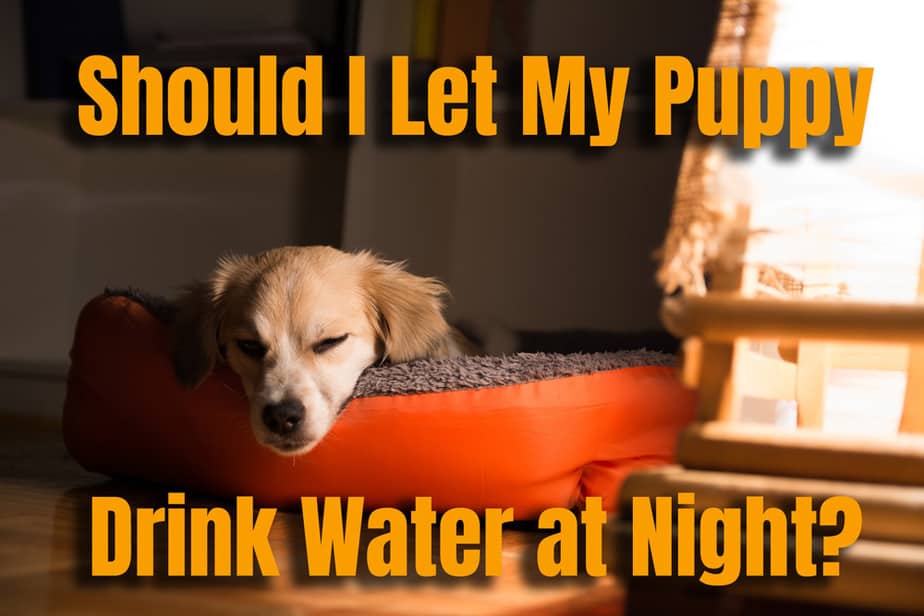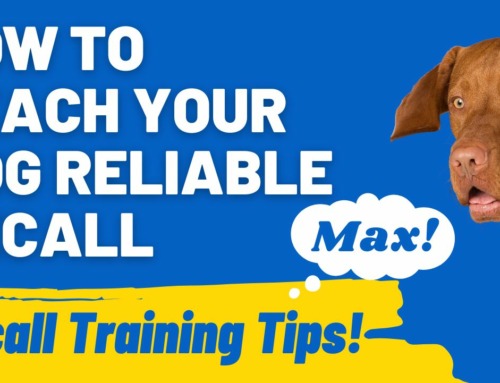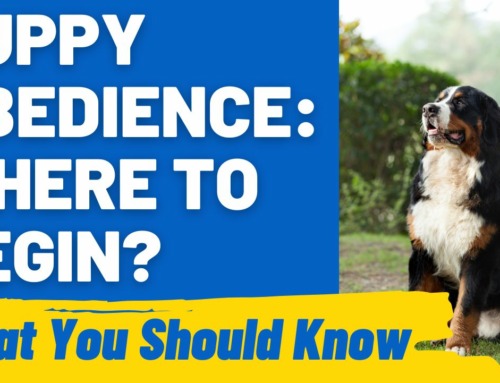Many puppy owners have wondered if it’s OK to take water away from their puppy at night, so they aren’t as likely to have an accident while their owners are sleeping.
There are several risks and benefits to controlling water intake in your puppy. We aim to provide you with a review of best practices so you can determine if you should be removing access to water for your puppy or not.
How much water does my puppy need?
Dogs require one ounce of water per pound of body weight per day. The formula is 1 fl oz. per 1 lb per 1 day.
Puppies may require slightly more than this amount as they are more prone to dehydration. Other factors include how much exercise they have had.
We also address this subject in full in our post How Much Water Should Your Dog Drink: (With Chart!)
Limiting your puppy’s water intake in order to make it easier for you to potty train can sound like a good plan, but done incorrectly, you may accidentally dehydrate your puppy.
Dehydration affects all areas of your dog’s body, and can lead to critical health problems.
Before deciding to take water away from your puppy, it’s important to know how much water your puppy should be drinking on average in order to avoid dehydration.
So be sure to keep in mind the above formula when deciding if you can restrict your puppy’s water intake.
Another consideration is if they’re eating wet food, as this has a water content that is difficult to measure. A dog who only eats a wet food diet will drink far less water than a dog who eats a kibble-only diet.
Risks associated with restricting nighttime water access
There are several risks associated with restricting water access, both behavioral and medical.
Besides dehydration – which was previously mentioned – restricting your puppy’s access to water can lead to obsessive behavior and an increased risk of urinary tract infections.
Water obsession
When water is only available for brief moments, your puppy may learn to obsess over water.
This often creates a dog that drinks all the water they can see, whether they actually need it or not.
Dogs that become obsessive over water, thinking it isn’t always available, can also start to drink from the pool, puddles, or other places they shouldn’t.
Some dogs that previously loved to play in a kiddie pool become unable to have access to one because they will try and continuously drink the entire pool of water.
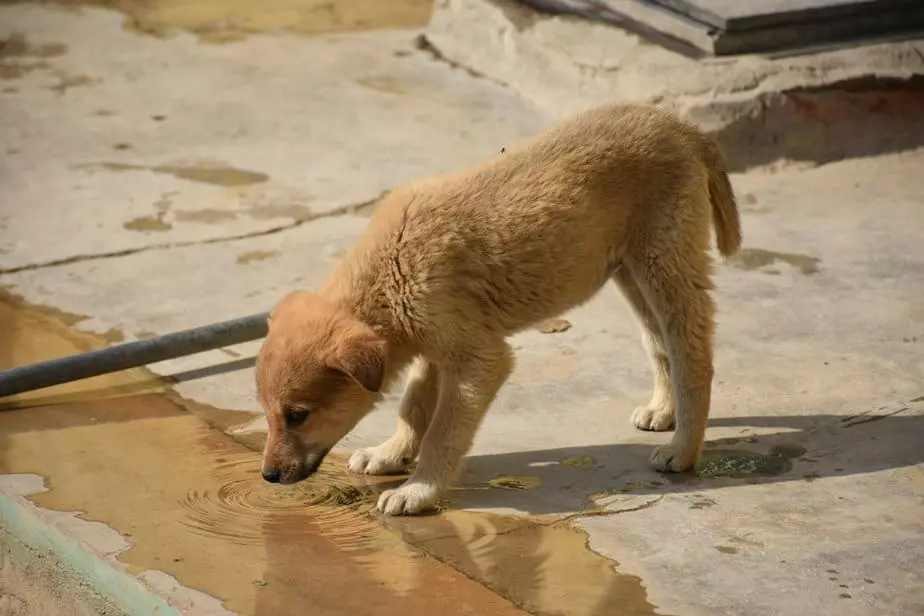
Can lead to resource guarding
In addition to obsessively drinking the water, your puppy may also start to exhibit resource guarding behaviors by growling or biting at anyone near their water bowl.
As with the obsessive behavior around water, this can turn into a dog that resource guards the toilet, sink, or other places with water as well.
Resource guarding can become a serious problem, especially if your puppy bites another dog or person.
Other related concerns
Besides the behavior problems, there are more health problems than just dehydration at risk. Dogs that obsessively drink all the water in sight may develop the following:
- Water intoxication
- Bloat
- Vomiting from the large amount of water they ingested
Restricted access to water also puts your puppy at risk of painful urinary tract infections. Not only are these infections very uncomfortable, but they can lead to additional health problems such as bladder stones and kidney damage.
Plus, the number one health problem that wreaks havoc on a potty training plan is a urinary tract infection.
If your puppy ends up with a UTI, they are much more likely to backslide in their potty training because of the urge to urinate more frequently as well as the pain associated with the process.
Are you interested in any of these posts:
Dog Drinking Water and Vomiting? Here’s Why…
Puppy Still Not House-Trained (Age Expectations)
My Dog Won’t Swim: Should I Be Worried?
When is it OK to remove access to water?
While there are plenty of risks associated with restricting water intake, there are also ways to safely set up your potty training program so that you reduce the risk of accidents without putting your puppy’s health at risk.
In general, your puppy should have unrestricted access to water during the day. As your puppy is playing and exploring, or even resting in their kennel while you’re away, it’s important that they have the opportunity to drink when they are thirsty.
Rather than restricting your puppy’s access to water during the day, you should instead pay attention to when they need to urinate and when they drink water.
For example, if you both just had a tiring play session and your puppy gulped water before napping, it’s reasonable to expect they will have to urinate immediately when they wake up.
It’s also beneficial to set a timer to ensure you take your puppy outside frequently enough that they have the opportunity to go to the bathroom in an appropriate location.
For young, small puppies, this often means starting with at least every 30 minutes when your puppy is awake.
You might also like this post of ours, At What Age Do Puppies Stop Pooping at Night?
Nighttime Water
While it’s generally agreed upon that controlling your puppy’s water intake during the day is too risky, taking away water before bedtime is usually an OK practice.
If you decide to take away your puppy’s water before bedtime, you should do so 2-3 hours before bedtime so they have ample opportunities to use the bathroom again before they are placed in their crate.
You might also like to read our post Is it Cruel to Crate a Dog at Night? (Yes or No)
Night Water Schedule
A schedule that works for many puppies and their owners is to take away food or water around 8 or 9 at night, with a final potty break before their owner falls asleep around 11 pm.
Then, most puppies will need to be up around 5-6am in order to use the bathroom again, at which point they should again have access to water.
Choosing to take away water before bedtime assumes you have provided your puppy with unrestricted access during the day.
Since your puppy will be sleeping overnight anyways, many dogs don’t need to drink water overnight unless there are health problems making it necessary.
It’s also important that you don’t restrict access to water if it’s hot, or if your puppy has just had to exercise, regardless of the time of day.
As dogs cool off by panting, failure to drink water will lead to dehydration.
If you will only be getting home from work to play with your puppy shortly before bed, you might not have an opportunity to remove water in this situation.
As your puppy grows older, develops good house training habits, and has fewer accidents overnight, you should start leaving water available further into the night to avoid any of the risks associated with removing access to water.
Can my puppy drink too much water?
Your dog isn’t likely to drink more than necessary unless they are playing in water. Biting at waves or at a spraying hose for an extended period of time can lead to the opposite problem of dehydration, known as water intoxication.
However, a healthy dog won’t drink themselves to the point of water intoxication, and should drink enough to avoid dehydration as well.
If you notice signs or symptoms of either condition, you should seek veterinary attention.
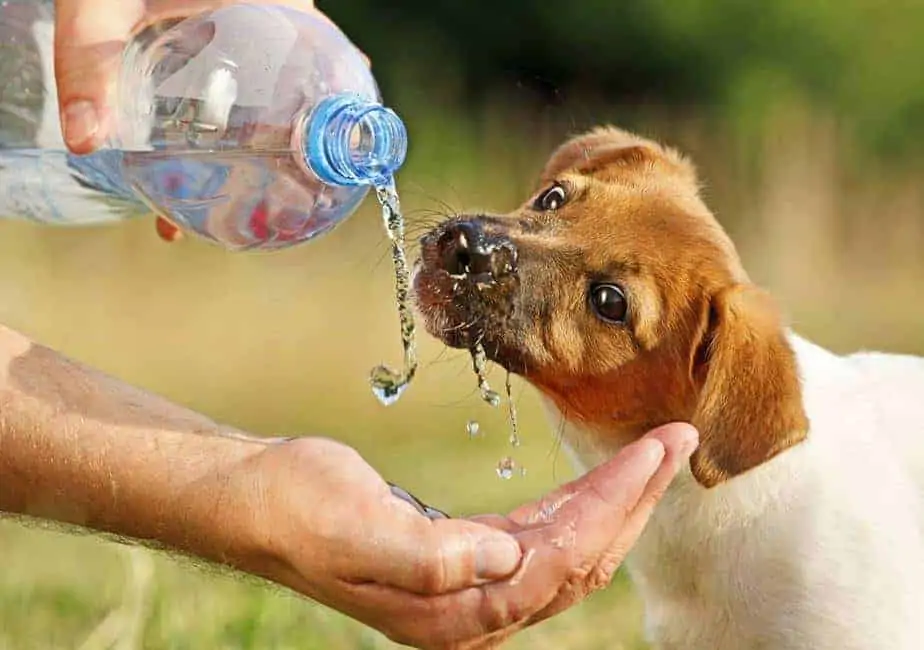
What should I do if my puppy has an accident?
Even the best potty training plans are bound to fail at certain points. Not only is it expected with any dog that is learning anything new, but young puppies struggle to have full control over their bladder.
When your puppy has an accident, it’s not a time to punish your puppy. They will gain nothing from that moment if they are punished for urinating or defecating in the house.
Instead, you should take a moment to consider what happened that contributed to the accident. Did your puppy drink a lot of water and you failed to take them outside? Did you forget to take them outside right after a nap?
Besides considering where you might have holes in your potty training plan that can be addressed in the future, you should also make sure to properly clean the accident with an enzymatic cleaner.
By using a product specifically designed to break down urine, rather than just mask the smell, your puppy is less likely to have an accident in that same spot again in the future.
We go into house-training your puppy in detail and every step a puppy needs to be successful in our mega-post: 7 Steps to Puppy Success (A Complete Guide)

